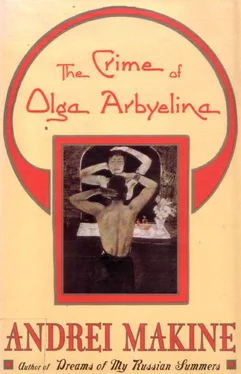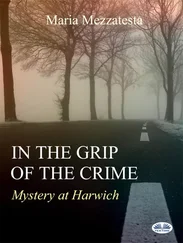During these lifeless days her thoughts often returned to that boy clad in a heavy man's overcoat, stamping with his foot on the frozen earth as he walked, as if in a gesture of childish anger. "He had no childhood," she said to herself. None of the simple joys the world owes a child. A garden around the family house, visits to grandparents… And more besides… None of all that. Pain. Anxious anticipation of further pain. An uneasy respite that would only last long enough to allow hope to be born and disappear.
One day she tried to rescue what could still be recovered from that void, insignificant scraps; a smile here, a moment of relief there. There was so little. Almost nothing. This memory perhaps: a cold, sunny day, a recollection from one of those winters lost in the first years of the impoverished childhood that she had not noticed passing… He is five or six and is seeing snow for the first time in his life. He runs toward her, making the dead leaves strewn with crystals crackle under his feet, and he shows her a fragment of ice with several blades of grass and a tiny flower head imprisoned in its moist transparency. She is on the brink of going into raptures, or embarking on scientific explanations. But some intuition holds back her words. They remain side by side, silent, watching the slow melting of the beauty and the release of the stalks, which, once outside the ice, become limp, and lose their magic.
She was lost so deeply in this moment of time past that it took her an instant for her eyes to focus on the winter dusk and the footpath running beside the wall of the Caravanserai. She was on her way back from the library. In one place she was obliged to press firmly against the wall, almost to flatten herself against its rough surface, in order to scramble over a big pile of snow. She accomplished this sequence of intricate maneuvers slowly and mechanically, already feeling she was somewhere else… In a long summer's evening several years before. The light of a hot, hazy sunset. The walls of the Caravanserai are warm and, as they were every summer, garlanded with hops. She is sitting on her wooden front steps, motionless, daydreaming, watching the footsteps of the child, this seven-year-old boy as he walks along the riverbank, stoops, rummages in the sand. Then comes over to her, radiant. "Look at this shape!" It is a fragment of limestone containing the broad, hollow spiral, studded with iridescent spangles, of an ammonite. The hollow is reminiscent of something and the similarity is disturbing. "It looks like a plaster cast for my knee," murmurs the child. She catches his eye, feels at a loss, and feigns gaiety: "Yes, but you know, your plaster cast…" The child interrupts her. Pressing his ear to the imprint of the shell, he is listening: "You can hear the sound of the sea… it's a sea that's not there anymore…" He holds out his treasure to her. She puts it to her ear, listens. What can be heard is the still of the evening, the cry of a bird, the carefully held in breathing of the child…
This blossoming of moments from long ago lasted until nightfall. Almost unaware she pushed open the door, took off her coat, went to light the range and make the tea… But alongside this activity these fragments of the past were unfolding, always quite humble and, it could have been said, useless, allowing her to dwell in their luminous time. She went up to the table, picked up her cup, the teapot… (A spring day, still in Paris in that dark apartment where the only ray of sunlight that ever comes in is at the end of the afternoon, reflected from the windows of the house across the street. The apartment where there is already a feeling of an imminent departure. The wan sunlight sidles onto the table and irradiates a bouquet of wild cherry blossom. Pausing on the threshold, she comes upon the child, his face buried in the white clusters, whispering in imitation of several voices, first pleading in tone, then passionate. She takes a step backward and the creak of a floorboard gives her away. The child raises his head. For a long time they look at each other in silence…) She came to herself in the middle of the kitchen, unable to think what to do with the cup and the teapot she was still holding, as if they were objects whose use was unknown…
Later in the evening she realized she had made an annoying omission, put her coat on again, went out onto the front steps, and cut notches all over the thick layer of ice on them with the help of an old ax. Then she walked back up the little footpath that ran beside the wall and slashed the slippery slope on the incline at the most dangerous spot…
Before she went to sleep there were several more luminous lapses into the past. And once, as she emerged and saw again in a flash all these images that her memory had secretly retained, she had this thought, which was so obvious it dazzled her: "So, I've forgotten nothing, I haven't missed anything at all…" Sleep was already numbing her mind. All she could grasp was that, without knowing it, she had preserved what was essential in this childhood, the part that was silent, true, unique.
… Next morning she would remember that the previous evening, lost in her reverie, she had drunk the infusion without examining its surface. She would guess that he had entered her room and come upon her, relaxed in unfeigned sleep.
It was on that morning, a winter morning, violet with cold, that for her time lost its rhythm of hours, days, and weeks.
She saw the young figure in the long overcoat passing beneath the window, pictured the slippery, frozen footpath he must follow, ran outside and cupped her hands to her mouth. Too late. He was already climbing the little steep, icy section-with that slightly brutal agility adolescents have, as their growing strength affirms itself. Having conquered it, he quickened his pace and turned the corner around the Caravanserai…
The limpid silence that reigned all about gradually seeped into her. The branch beside the steps was quivering where the boy had brushed against it and shedding a light veil of hoarfrost crystals that made rainbows in the air. Her mind was empty, but with her whole being she felt that she could have stood there on the steps forever, looking out at the snow-covered meadow sloping down toward the river; at this slow powder of crystals falling from a branch stirred by already imperceptible vibrations. Yes, stood there in the sundrenched sleepiness of a morning that belonged to no year, to no era, to no country. That did not even belong to her life but to quite another life, in which contemplating glittering snowflakes in silence, in the absence of all thought, was becoming essential…
She looked at other branches, higher up, reaching toward the pale blue of the sky, then at those of the woodland beyond the walls of the Caravanserai. The sun, still low, softened their black, angular lines with a purple-tinged glow. It seemed to her that she had never felt so mysteriously close to these trees, their bark, their bare branches. Nor so intensely exposed beneath the sky, so intensely herself, facing this immense, patient expectation…
The glittering specks of the hoarfrost still meandered in the icy air. The calm seemed infinite. And yet within this silent radiance it was as if you could hear a faint, continuous tinkling-sounds beyond hearing echoed one another with faultless purity and precision. The air faindy pink; the dark tracery of the branches; the dancing of the crystals; the fortress of the Caravanserai still in the blue shadow of the night; the sunlight lightly touching the snow among the trees… This ethereal equilibrium of lights and silences was alive, guarded its own transparency, was not going anywhere. Motionless on the little wooden steps, she was a part of it and felt herself to be strangely necessary to all that surrounded her…
Читать дальше












